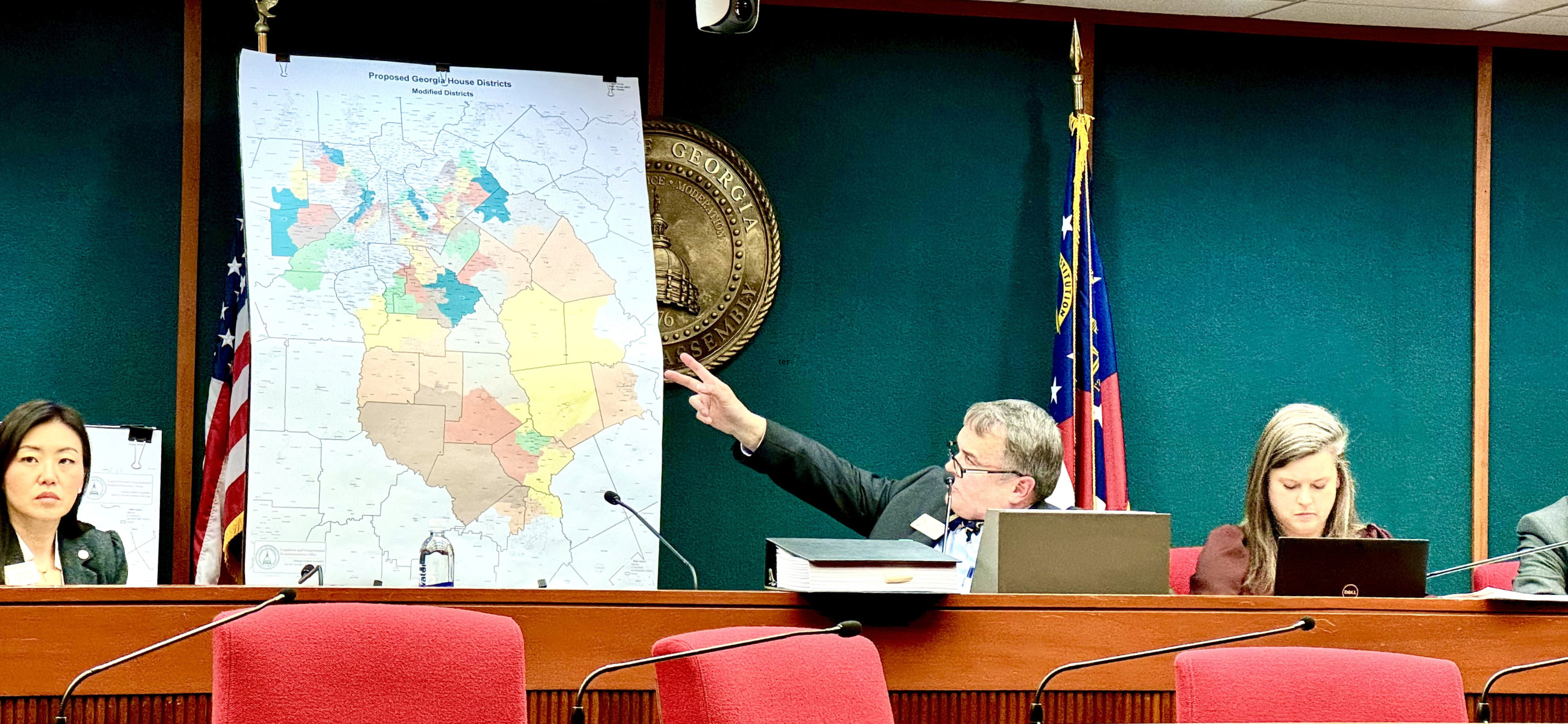Stay ahead of the curve as a political insider with deep policy analysis, daily briefings and policy-shaping tools.
Request a DemoFederal judge greenlights Georgia’s new congressional, legislative maps

Rep. Rob Leverett, R-Elberton, explains proposed changes to the House district map during the meeting of the House Reapportionment and Redistricting Committee on Nov. 29, 2023. (Credit: Jill Jordan Sieder)
Gist
ATLANTA — U.S. District Judge Steve Jones on Thursday upheld Georgia’s new congressional and legislative maps, much to the consternation of Democrats and civil and voting rights groups who contend the maps still violate the 1965 Voting Rights Act.
Jones’ ruling is a major win for state Republicans who drew the maps and continue to retain political control. Republicans will keep a 9-5 advantage in the congressional delegation — a crucial position, given the 2024 election.
“The judge's ruling reflects the fact that the Republican leaders and members took him very seriously,” Republican strategist Brian Robinson said. “They did everything they could to follow the letter of the law and his ruling. And that diligence paid off.”
Kevin Olasanoye, executive director of the Democratic Party of Georgia, called the ruling disappointing. “While we respect the court's ruling, we are more committed than ever to ending Republicans' days of diluting minority voting power via gerrymandering,” Olasanoye added. “Voter protection and empowerment is at the heart of Georgia Democrats' mission, and we will fight harder than ever to ensure that every Georgia voter can make their voice heard in our democracy."
What’s Happening
Jones’ decision comes three weeks after the Republican-led General Assembly redrew the maps during a special legislative session that, at times, devolved into a contentious, political row. In October, Jones ordered the lawmakers to redo the 2021 maps because he said they diluted Black voting power and thus violated the Voting Rights Act.
The judge, an Obama appointee, laid out instructions in a 516-page order on how the maps could be redone, zeroing in on metro Atlanta. The congressional state Senate and state House maps need to better reflect the growing share of Black residents among Georgia’s voting-age population, Jones said, without dismantling other districts that had healthy minority representation.
The congressional map was considered to be the most vulnerable map headed into Jones’ Dec. 20 redistricting review of the new maps. It creates a new majority-Black 6th District while dismantling the 7th District. No single racial or ethnic group is the majority in the 7th District but the coalition of Blacks, Latinx and Asians in the suburban Atlanta district tend to vote Democrat. The existing 7th District is represented by U.S. Rep. Lucy McBath, who is Black. McBath said on Thursday that she plans to run in the newly-formed 6th Congressional District.
“The court finds that the general assembly fully complied with this court’s order requiring the creation of Black-majority districts in the regions of the state where vote dilution was found,” Jones said in his order.
Why It Matters
Georgia’s case is one of several lawsuits that could determine which political party controls the U.S. House of Representatives after next November’s election. Democrats need to get five Republican seats nationally to gain control.
Nationally, there are legal battles over redistricting in 10 states. That could set the stage for new congressional maps for the 2024 elections and depending on the outcome, flip control of the House, which now has a 221-213 Republican majority, Reuters reported.
Meanwhile in Georgia, one redistricting expert found Jones’ ruling unusual.
“I’m surprised by his ruling on the congressional map,” University of Georgia professor Charles Bullock, the nation’s preeminent scholar on redistricting, told State Affairs. “Even some Republican legislators thought it was potentially vulnerable and the vulnerability relates to the portion of his original order which said that in creating the new majority-Black districts, you could not dismantle any minority influence districts. And some people thought the 7th (Congressional) District is a minority-influence district and it really has been dismantled.”
What’s Next
While Jones has rendered his decision, it may not be the final decision.
Shortly after lawmakers submitted the new maps for Jones' review, attorneys for Alpha Phi Alpha Fraternity filed objections to Georgia’s new maps. The Black fraternity said the maps don’t provide more chances for Black voters to choose candidates for Congress or the General Assembly. Alpha Phi Alpha is a plaintiff in the original lawsuit against the maps.
“I imagine the plaintiffs will probably appeal but given the timeline, I think this will be the maps that we'll be using in 2024,” Bullock said.
Have questions? Contact Tammy Joyner on X @lvjoyner or at [email protected].
And subscribe to State Affairs so you do not miss an update.
X @StateAffairsGA
Facebook @StateAffairsGA
Instagram @StateAffairsGA
LinkedIn @StateAffairs
Read this story for free.
Create AccountRead this story for free
By submitting your information, you agree to the Terms of Service and acknowledge our Privacy Policy.
Weekend read: 70 years ago, Georgia bucked landmark Brown v. Board of Education decision
When the U.S. Supreme Court threw open the doors of public schools to Black students 70 years ago, Southern states — such as Georgia — did not go quietly when Brown v. Board of Education of Topeka became the law of the land.
“For six or seven years nothing happened. It was like it hadn’t come down,” said Charles Bullock, professor of public and international affairs at the University of Georgia.
Some states took action to desegregate schools, “but the Deep South didn’t,” Bullock said. There was “a lot of litigation,” he added. “Someone said as long as we can legislate, we can segregate. So nothing much happens until January of 1961.”
That is when a federal judge ordered the immediate admission of Hamilton Holmes and Charlayne Hunter to the University of Georgia.
“Georgians accept the challenge and will not tolerate the mixing of races,” Georgia’s then-governor, Herman Talmadge, said when the decision came down.
Talmadge went on to deride the high court, saying its “views on sociology will not make any difference.”
He wasn’t alone.
In Virginia, U.S. Sen. Harry Byrd issued a call for “massive resistance” to the Supreme Court’s decision. In Mississippi, U.S. Sen. James Eastland declared that “the South will not abide by nor obey this legislative decision by a political body.”
Brown towers as one of the most significant Supreme Court rulings in American history. Students from the era attended a 70th-anniversary event held at Burnett Administrative Center in Topeka on Thursday.

Tiffany Anderson, the first African American female superintendent hired by Topeka Public Schools, said the decision allowed for “tremendous progress” in the area of equitability simply by expanding educational opportunities.
“Whether or not you’re a parent of color or in poverty, you have access,” she said. “Those are ways to close the opportunity gaps.”
Don Perkins, though, said the district’s race relations had not evolved in a meaningful way. His children, who attended Topeka Public Schools in the 1980s, were exploited by the district for their athletic abilities, he said.
“I always smelled the chlorine but just wasn’t allowed to swim.”
He remembers his first taste of racial integration as a Black student at East Topeka Junior High.
“I got a lot of support from students, but not necessarily teachers,” said Perkins, who was elected student council president but couldn’t get any support from educators for activities.
Perkins recounted how the ruling hardly erased discrimination. For instance, Black students were barred from Topeka High’s indoor swimming pool when he attended from 1955 to 1957. “I always smelled the chlorine but just wasn’t allowed to swim,” he said.
The U.S. Supreme Court decision is rooted deep in Topeka, forever stitched in Kansas’ tapestry.
A moving mural by artist Michael Young commemorating the decision — depicting teachers, students, protesters, soldiers — can be found outside the old Supreme Court room in the Statehouse. About a mile south, a museum commemorates the case and its aftermath.

States challenging school segregation in the early 1950s included Kansas, South Carolina, Delaware and Virginia, as did Washington, D.C. The mounting litigation was bundled into a single case — Brown v. Board of Education of Topeka.
The Kansas case was filed on behalf of 13 Black Topeka parents and their school-aged children who were forced to attend segregated schools. The students would often have to walk for hours, braving the elements, when white classrooms were closer.
The court ultimately declared state-sanctioned segregation in public schools unconstitutional after concluding the plaintiffs were not allotted “equal protection of the laws guaranteed by the 14th Amendment.” “Separate but equal” was determined to be “inherently unequal.”
The decision reverberated. The high court then decided Briggs v. Elliott, finding desegregation in South Carolina was unconstitutional. Again the issue was the distance to the classrooms — some Black students walked eight miles each way to and from school after the local government refused to provide bussing.
The price of desegregation in South Carolina was steep. The petitioners in the Briggs case lost their jobs and their land. A pastor who championed the cause had his home burned to the ground. The federal judge who sided with petitioners was forced to leave the state by order of the South Carolina House of Representatives.
Pushing for change
Marquis Burnett grew up in the shadow of his late father, McKinley, a prominent Civil Rights figure. While serving as the Topeka chapter NAACP president, McKinley Burnett spearheaded the recruitment of the 13 Black families that were plaintiffs in the Brown v. Board case.
“I’m not saying the case wouldn’t have happened, but if it wasn’t for him it wouldn’t have happened when it did,” Marquis Burnett said of his father. “A lot of people think it was the Brown case, but it was actually the Topeka NAACP’s case that established integration. They’re the ones who filed the case and picked Brown [and the other plaintiffs].”


His father consistently pressed the Topeka school board for racial integration, and the board responded by drastically altering meeting times in hopes he wouldn’t show. He was also met with threats of physical violence from board members, Burnett said.
“On several occasions, board members wanted to resolve it with a fistfight,” Burnett said. “But he said, ‘No, we’ll let the courts settle it.’”
Burnett said he’s skeptical that the current conservative-leaning U.S. Supreme Court would have rendered the same verdict in the Brown ruling as its 1954 judicial counterparts.
Burnett said the Brown v. Board ruling was not necessarily viewed favorably by Black teachers at Topeka’s segregated elementary schools, who were concerned about the fate of those schools after the ruling came down.
“They thought they would lose their jobs, but that didn’t really happen because our teachers were exceptional,” he said. “We had good teachers, and that is something that should definitely be emphasized.”
Marquis Burnett planned to attend the event Thursday at Burnett Administrative Center on Thursday, a building named in honor of his father.
‘Culture of community’
Beryl New began attending Monroe Elementary in the wake of the Brown ruling. The school was eventually transformed into the Brown v. Board of Education National Historical Park.
New said teachers at Monroe embraced a “culture of community” and a “high expectation for excellence” in the classroom. As for the lasting impact of the Supreme Court’s ruling, New drew a parallel to current hotbed issues.

“This concept of ‘school choice’ has a whole different meaning today. I can choose to send my children to a private school or a public school or choose to go to the public school I want to,” she said. “Back then, there was no choice if you were a child of color in Topeka. So removing that right from tax-paying citizens was a great injustice.”
After the ruling, New said, many parents did not want to move their children to an integrated school “because of the loving atmosphere” at the segregated schools they attended.
“But if they wanted to do it, they ought to have the right to do it,” New said. “And I think that’s what the Topeka case really highlighted.”
At the time of the Brown ruling, white parents in Topeka “did not want Black teachers to teach their children,” New said.
“But many of the Black teachers who taught at the segregated schools had advanced degrees,” she said. “So you couldn’t get a higher quality of teacher, but their skin color was the issue.”
New’s “pleasant memories” of Monroe Elementary stood in stark contrast to her experience at racially integrated Topeka High School in the 1960s. New said her counselor at Topeka High bluntly told her “she wasn’t college material” and should instead enroll in secretary school.
New’s education credentials include 12 years as an English teacher, followed by several years as principal at Lawrence High School. Then, New moved to Highland Park High School, where she became the first Black female head principal in the history of Topeka Public Schools’ main three high schools.
Brown v. Board’s lasting impacts
Visiting from Charlottesville, Virginia, this week, Aleen Carey said she felt goose bumps Tuesday evening while taking in the majestic atmosphere of the former Monroe Elementary School building.
As a former educator, she said that the Brown ruling holds a deeper meaning for her — and that she taught her former students about the “Charlottesville Twelve,” which has similarities to the case.
“As a Black resident of the United States, this historical place has made such a difference in the lives of my family and every other Black person in the United States,” Carey said. “I just wanted to be able to say that I had stood here and seen it for myself. This is more important than anything else I could be doing on my visit.
“What it means to be a Black person and have the education I’ve had, you can’t put that into words what something like this means.”
It was a joyous moment for Carey, but she also remains concerned about political agendas seeking to roll back strides made during the Civil Rights Movement.

Former President George W. Bush was on hand in 2004 to commemorate the 50th anniversary of the Supreme Court ruling and the official public opening of the Brown v. Board museum.
“So even though [Bush] wasn’t my favorite president, the respect shown to say this is a very important piece of American history and to be here means something,” she said.
Carey also remains concerned about diversity, equity and inclusion (DEI) at state universities in Virginia.
Lawmakers in many states have proposed or enacted legislation aimed at rolling back DEI initiatives at public colleges and universities.
In Kansas, the GOP-controlled Legislature passed House Bill 2105 in April — prohibiting postsecondary educational institutions from using DEI practices in their admissions, educational aid and employment decisions.
Undoing the racial equity strides that followed the Brown decision is unfathomable for Carey to contemplate.
“It’s unbelievable, sad, infuriating and frustrating,” she said. And it’s really hard to think about when you’re at a place like this, knowing the courage it took to make Brown v. Board happen.”

Newsletter editor Issac Morgan contributed to this story.
Matt Resnick is a statehouse reporter for State Affairs Pro Kansas/Hawver’s Capitol Report. Reach him at [email protected].
Issac Morgan is the newsletter editor for State Affairs. You can contact him on X or at [email protected].
Turnout battle: More Republicans casting ballots in early voting for general primary
The Gist
Whether they’re concerned with a Georgia Supreme Court race or women’s reproductive rights, voters showed up to cast early ballots this week in the Georgia primary election. And Republicans embraced the opportunity more than Democrats, continuing a trend in recent years.
“This isn’t Democratic voters becoming Republicans. This isn’t even a massive turnout of Republicans,” Atlanta political strategist Fred Hicks told State Affairs. “What it is is Democrats are disaffected and they’re staying home in key blocs, particularly African Americans.”
At Chastain Park Recreation Center, Atlanta attorney Stephen Mooney cast his vote with an eye on a Georgia Supreme Court race.
“I felt it was important to cast a vote. We have one candidate who’s putting his personal views over just calling balls and strikes. I want to make my voice known,” Mooney said.
Democratic U.S. Rep. John Barrow, who is running a campaign centered on protecting women’s reproductive rights, is challenging incumbent Justice Andrew Pinson.
Mooney, who identifies as Republican, said he typically votes early in elections. For the upcoming cycle, he said he’s concerned with crime, the economy and world affairs, including the conflict in Gaza.


Katherine Hernacki, who mostly votes Democrat, said she tries to cast ballots at every opportunity to make sure her registration didn’t expire and to preserve her vote.
“I would say that right now one of the biggest motivating factors for me is protecting women’s rights to reproductive freedom,” Hernacki, 50, told State Affairs.
She and Mooney both said current Georgia state officials have been doing well, specifically when it comes to the economy.
What’s Happening
As of Friday morning, according to GeorgiaVotes.com, 453,035 Georgians had cast early votes. Republicans outpaced Democrats, 242,140 to 203,305. There were 7,545 nonpartisan ballots cast.
The Secretary of State could not provide the party breakdown of primary election turnout for 2020 and 2022.
The total turnout for the 2024 primary is 36% lower than it was in 2022.
“This will be the fourth straight statewide election where Republicans have outpaced Democrats,” Hicks said.
More Republican voters turned out in the 2022 primary and general election as well as the presidential primary in March and now this one, said Hicks, who has worked on Democratic and Republican campaigns across the country for the past 20 years.
There was a little positive news for Democrats: The Georgia Secretary of State’s office said more Democrats — 15,008 — voted absentee than Republicans. Records show 14,835 Republicans cast mail-in ballots.
Why It Matters
Primaries historically have had low turnout, and this election cycle is no different. As of Friday morning, 6.4% of Georgia’s 7 million registered voters had cast ballots in person or by mail.
Ahead of the general election in November, primaries give voters an idea of who the candidates are. As campaigns continue, citizens get an early opportunity to form their political opinions.
What’s Next?
Friday, May 17, is the last day of early voting in Georgia’s primary election. Polls will reopen Tuesday, May 21, from 7 a.m. to 7 p.m. The general election will happen Nov. 5.
Related stories:
Have questions, comments or tips? Contact Tammy Joyner on X @lvjoyner or at [email protected].
Contact Nava Rawls at [email protected].
New middle Georgia House district up for grabs due to influential incumbent’s departure
The Gist
For the first time in over a decade, voters in parts of middle Georgia’s Bibb and Houston counties will vote for a new state House representative.
House District 143 is a newly redrawn district that now extends from Macon to Warner Robins. That redistricting prompted the departure of longtime incumbent Rep. James Beverly, D-Macon. His term ends in January.
Democrat Anissa Jones and Republican Barbara Boyer are vying for Beverly’s seat. Both are uncontested in the primary.
The two appear on the May 21 primary ballots, but the primary is, in effect, a dress rehearsal for the Nov. 5 general election because neither has a primary opponent.
Jones is a chiropractor who has held numerous seats on civic and local government boards. Boyer is a retired attorney who now runs an antique shop. Georgia is an open primary state, meaning voters can choose the party ballot they wish to vote for.
What’s Happening
House Minority Leader Beverly announced in March he would not seek re-election, in part, because his district had been redrawn. A federal judge ordered state lawmakers to redo their electoral maps because they diluted Black voting power.
Before the remapping, House District 143 was largely Democrat, majority Black and consisted primarily of Macon County. The redrawn district now includes parts of Macon and extends 20 miles south to Warner Robins and remains majority Black.
Boyer, a political newcomer, said Republicans asked her to run because of her legal background. She sees the redistricting as good for middle Georgia.
“Macon and Warner Robins have always sort of been merged together in a lot of ways, and I just don’t see there’s a problem with it.”
The new House district, for example, now includes parts of nearby Houston County, which has “a pretty good school system,” Boyer said.
“I’m interested in how they run their school system compared to how Bibb County runs theirs,” she added. “Our [Macon-Bibb] district really needs a lot of help with their school system.”
If elected, Boyer said she would work to improve education, curb crime and bring more businesses to middle Georgia.
“I think I cross party lines pretty good,” she said. “I have a lot of Democratic friends and a very diverse group of friends. So I think I have a better chance of getting some Democrat and independent votes.”
Jones is a Macon native. She is the former vice chair of the Macon Water Authority Board, an alum of Leadership Macon and a past president of the Main Street Macon Board.
Jones did not return calls from State Affairs for comment.. Her top issues include public safety, economic development and more investment in infrastructure, according to her website.
Why It Matters
The winner of House District 143 will fill a vital seat that Beverly has held since 2011. He often advocated for legislation addressing health inequities, including a last-minute proposal by state Democratic leaders to expand Medicaid.
The Peach Care Plus Act would have let the state get a federal waiver to buy private health insurance for people who make around $20,000 a year. The measure failed. Beverly, a Macon optometrist, also pushed for legislation that would reduce maternal mortality among Black women.
He also led the Democrats’ effort to pass the Safe at Home Act, a bipartisan bill to protect tenants’ rights. The bipartisan bill requires rental properties to be “fit for human habitation.” Landlords must give three days’ notice and can’t shut off cooling before an eviction. Gov. Brian Kemp signed the bill into law in April.
Beverly said his decision to leave was also based on the likelihood that Democrats will not win a majority in the 180-member House.
In addition to Beverly’s departure as House minority leader, the Senate also will lose its minority leader, Sen. Gloria Butler, D-Stone Mountain. She has served since 1999. The two are among 16 legislators who are retiring. Most of the 236-member Georgia General Assembly will be running for office, many unopposed.
What’s Next?
Early voters casting ballots in person have until Friday at 5 p.m. Poll officials, however, have the discretion to keep the polls open until 7 p.m., a Georgia Secretary of State official said. Polls will reopen Tuesday, primary election day, from 7 a.m. to 7 p.m.
Residents voting in Tuesday’s primary can check their precinct location here.
Boyer and Jones will face each other in the Nov. 5 general election. The winner will succeed Beverly, who will leave office in January.
Meet the House District 143 primary candidates

Barbara Boyer
Age: 68
Residence: Macon
Occupation: Retired attorney who now owns an antique store in Macon. “I love to stay busy.”
Party affiliation: Republican
Top issues: Improving education, attracting more businesses and addressing public safety, especially encroaching crime.
Campaign cash on hand: $600 as of May 7
Family: She and husband Wesley, a bankruptcy attorney, have a daughter and granddaughter

Dr. Anissa Jones
Residence: Macon
Occupation: Chiropractor
Party affiliation: Democrat
Top issues: Public safety, economic development, more investment infrastructure.
Campaign cash on hand: $30,679.92 as of May 6
Have questions, comments or tips? Contact Tammy Joyner on X @lvjoyner or at [email protected].
All you need to know heading into the May 21 primary
Gist
Georgia’s primary is only days away, and there’s a lot to unpack.
The May 21 primary will be the first time some Georgians will be voting in new districts for state and congressional candidates. They’ll also be voting in local races for sheriff, judges, school board or county commission members. Primary winners who have challengers will go on to compete in the Nov. 5 general election. Georgia is an open primary state, meaning voters can choose the party ballot they wish to vote for.
This year, Georgians who voted by absentee ballot in the primary could face challenges due to mail delivery delays.
What’s Happening
North Georgia and metro Atlanta are seeing significant mail delivery delays. The holdup, according to media reports, appears to be at the United States Postal Services’ new Regional Processing and Distribution Center in Palmetto. The problem has led to dangerous situations in which people are not getting critical medication.
Georgia’s U.S. Sen. Jon Ossoff recently grilled USPS Postmaster General Louis DeJoy on the delays. Ossoff told DeJoy during an April 16 hearing that on-time delivery rates were abysmal. He said 66% of outbound first-class mail had been delivered on time while 36% of inbound mail had been delivered on time in the past three months.
DeJoy blamed the problem on the difficulty in condensing operations at the facility.
With the approaching primary, state lawmakers are concerned mail delays could disrupt the election process.
Mike Hassinger, a spokesman for the Secretary of State, told State Affairs that Georgia voters are ready.
“Georgia voters are already registered,” he said. “They know how they like to vote. More than half of them vote early. About 5% vote absentee by mail, just in general, and then the rest are voting on election day. So we’ve been able to set up systems that are familiar with Georgia voters so that the percentage who might be worried about their absentee-by-mail ballots are relatively small.”
Why It Matters
Georgia emerged as one of the country’s most important political battleground states during the 2020 election. The Peach State will once again play a key role in deciding who wins the 2024 presidential election in November.
In the May 21 primary, Georgia voters will whittle down their choices for whom they’ll send to Congress and to the state capitol next year.
Under a federal court-approved redistricting process last year, Georgia now has new congressional and state district electoral maps. Those maps created one majority Black seat in the U.S. House of Representatives, five new majority-Black districts in the state House and two in the state Senate.
The redistricting resulted in new seats, intriguing matchups and former politicians returning to the fray. You can see the newly drawn maps here.
What’s Next?
Here’s what you need to know to ensure a smooth voting process:
To vote early.
Early voting is April 29 to May 17. Find your polling place here.
To vote absentee.
Here’s what you can do to avoid problems if you vote absentee:
- Get your absentee ballot application done early. You can request an absentee ballot here. (The registration deadline for the May 21 primary was April 22.)
- Track your application through Georgia BallotTrax. You must have a valid absentee request on file with your county board of elections to see your absentee ballot status in Georgia BallottTrax.
- If you’ve been having mail delays, place your completed absentee ballot in an official drop box during advanced voting instead of using the United States Postal Service. Check your county voter registration and election office for drop box locations. And, yes, your absentee ballot counts. It is counted in the final tally, not just close races.
- If you change your mind about voting absentee and decide to vote in person, take your absentee ballot to your local election office, where workers will void it.
- If you need to contact your county election office, find that information here.
Update: This story has been updated with the mail-in ballot registration deadline for the May 21 primary.
Have questions, comments or tips? Contact Tammy Joyner on X @lvjoyner or at [email protected].
And subscribe to State Affairs so you do not miss any news you need to know.




